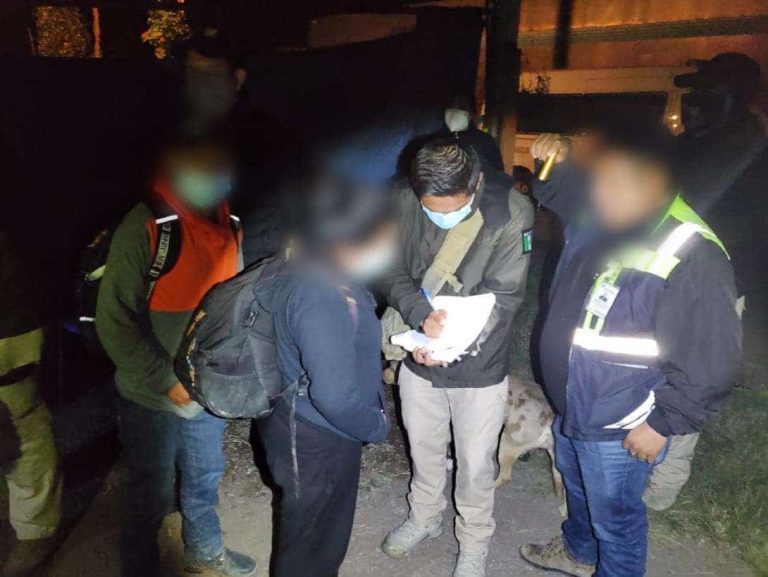6 de octubre 2022

The Return of the Military

PUBLICIDAD 1M
PUBLICIDAD 4D
PUBLICIDAD 5D
Alert on kidnapping scams affecting Nicaraguan migrants in Mexico

Familiares de migrantes detenidos en Migración son extorsionadas con falsos secuestros. En la fotografía se observa a un grupo de migrantes, entre ellos nicaragüenses, detenidos por el INM de México. Foto: cortesía
Criminal gangs in Mexico are using Nicaraguan migrants traveling to the United States to extort money from their relatives, through kidnappings and fake kidnappings, warns the Texas Nicaraguan Community initiative. The group provides support to relatives of missing and deceased migrants.
“Unfortunately, they are aware that Nicaraguans are not going to leave their relative without assistance, and that they are going to get money from wherever they can to help them. So, this has become a booming business for these criminals,” they noted.
The modus operandi includes the execution of real or fake kidnappings. The latter consists in that the criminal groups contact a relative in Nicaragua, who has reported on social networks that they have lost contact with their migrant family member. They tell them that they have kidnapped them, when in reality the person is detained by immigration authorities.
Regarding these criminal patterns, the Texas-Nicaragua group made a series of recommendations that would help Nicaraguan families to avoid falling victims of extortions. Among these, they point out that “the worse mistake” is to report on social networks about the disappearance and not to proceed to denounce through the corresponding means. Likewise, they emphasize that relatives should learn to differentiate a kidnapping from a fake kidnapping.
“Kidnappers and extortionist (fake kidnappers) are two different things. In a kidnapping they are going to give you immediate proof of life. The kidnapper will send a video and your family member will say that he or she is kidnapped and that they are asking for this amount of money in so many days,” they explain.
However, when it is a fake kidnapping scam, the relative will not have a real proof of life. That is, he/she will not be able to talk to the alleged victim. They will only receive edited photographs to pressure them into sending money.
“An indication that you are being a victim of a scam is when they send you a photo and once you have seen it, they delete it. That is surely a scam,” they explain.
The group of volunteers points out that, in the event of a possible kidnapping, the first action to take is to report it to Mexico’s National Search Commission, which is present in all Mexican states.
They recommend that the denunciation be made within 24 hours of the last communication with the migrant’s family member. This authority will verify if the migrant is detained in any Immigration delegation. The National Commission has a period of one day to respond to the family.
If the family member is in detention, the same National Commission will request immigration to allow the family member to communicate with his/her family in Nicaragua because he/she has the right to a phone call. This mechanism will prevent family members from falling into fake kidnapping scams.
“We have already seen several families that in their despair collect the money, pay and two days later get contacted by their family member and find out that in reality he or she was in an immigration detention center, not kidnapped. The family did not want to make the report out of fear and in the end, they lost their money because there was no kidnapping,” they stressed.
They also explain that there have been cases where family members pay for this type of fake kidnapping and then find out that their family member is in the morgue and the family didn’t know about it because “they did not want to file a report because they were told if they did that they were going to kill their family member.”
In the case of actual kidnappings, they state that there is no certainty that the criminal groups will release the migrants after receiving payment. However, they warn that in these cases they have seen a cycle of several kidnappings of the same person.
“There are people who say they have been kidnapped three or four times. The same criminal groups say: “there go three people, they gave me three thousand dollars,” so they are handed over to other groups and they are going to charge you another amount of money. So, Nicaraguans have become a business on Mexican soil,” they regret.
This modus operandi has progressed because the kidnappers have seen that in the case of Nicaraguans they do agree to pay. So, when they find groups of migrants of different nationalities, they tend to select our nationals.
“We have not seen the kidnapping of a Cubans or Venezuelans, but we see the kidnapping of Nicaraguans on a weekly basis,” they say and add “the families that are most often victims are the large groups, of seven or eight, with backpacks that draw a lot of attention.”
This article was originally published in Spanish in Confidencial and translated by Havana Times.
PUBLICIDAD 3M
Confidencial es un diario digital nicaragüense, de formato multimedia, fundado por Carlos F. Chamorro en junio de 1996. Inició como un semanario impreso y hoy es un medio de referencia regional con información, análisis, entrevistas, perfiles, reportajes e investigaciones sobre Nicaragua, informando desde el exilio por la persecución política de la dictadura de Daniel Ortega y Rosario Murillo.
PUBLICIDAD 3D